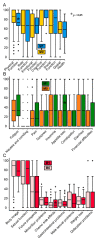Differences in and Prognostic Value of Quality of Life Data in Rectal Cancer Patients with and without Distant Metastases
- PMID: 33374955
- PMCID: PMC7821945
- DOI: 10.3390/healthcare9010001
Differences in and Prognostic Value of Quality of Life Data in Rectal Cancer Patients with and without Distant Metastases
Abstract
(1) Background: Individualization of treatment is a major challenge in oncology and requires a variety of predictive and prognostic parameters. In addition to tumor biology analyses, baseline health-related quality of life might be a valid tool to predict overall survival. This study was conducted to evaluate the prognostic relevance of baseline quality of life data in patients with rectal cancer. In this context, differences between patients with and without distant metastases were of particular interest. (2) Methods: Our cohort included 258 patients with rectal cancer treated in the radiotherapy department of the University Hospital Erlangen. Patients completed the European Organisation for Research and Treatment of Cancer (EORTC) core quality of life questionnaire (QLQ C30) and colorectal cancer questionnaire (CR38). Clinical and survival data were provided by the Gießener Tumor Documentation System (GTDS) of the Comprehensive Cancer Center Erlangen-EMN (CCC, Friedrich-Alexander University Erlangen-Nuremberg, Erlangen, Germany). Statistical analyses were performed using Kaplan-Meier analyses and univariate and multivariate Cox regression. (3) Results: A cohort of 258 patients with rectal adenocarcinoma was analyzed including 50 patients (19.4%) with metastatic disease. No differences were observed between patients with and without distant metastases in most areas of quality of life studied, with the exception of physical function, loss of appetite, chemotherapy side effects and weight loss. Gender, baseline physical function, sexual function, diarrhea, and weight loss over time had a prognostic value in the entire cohort. Appetite loss was an additional prognostic parameter in patients with distant metastases. (4) Conclusions: The quality of life of patients with metastatic disease differed only slightly from non-metastatic patients. Health-related quality of life data provide prognostic information for patients with rectal cancer.
Keywords: colorectal cancer; health related quality of life; metastatic disease; patient reported outcomes; prognostication.
Conflict of interest statement
The authors declare no conflict of interest.
Figures





Similar articles
-
Baseline quality of life as a prognostic indicator of survival: a meta-analysis of individual patient data from EORTC clinical trials.Lancet Oncol. 2009 Sep;10(9):865-71. doi: 10.1016/S1470-2045(09)70200-1. Epub 2009 Aug 18. Lancet Oncol. 2009. PMID: 19695956
-
A global analysis of multitrial data investigating quality of life and symptoms as prognostic factors for survival in different tumor sites.Cancer. 2014 Jan 15;120(2):302-11. doi: 10.1002/cncr.28382. Epub 2013 Oct 11. Cancer. 2014. PMID: 24127333
-
Nivolumab versus standard, single-agent therapy of investigator's choice in recurrent or metastatic squamous cell carcinoma of the head and neck (CheckMate 141): health-related quality-of-life results from a randomised, phase 3 trial.Lancet Oncol. 2017 Aug;18(8):1104-1115. doi: 10.1016/S1470-2045(17)30421-7. Epub 2017 Jun 23. Lancet Oncol. 2017. PMID: 28651929 Free PMC article. Clinical Trial.
-
Validation of patient's self-reported social functioning as an independent prognostic factor for survival in metastatic colorectal cancer patients: results of an international study by the Chronotherapy Group of the European Organisation for Research and Treatment of Cancer.J Clin Oncol. 2008 Apr 20;26(12):2020-6. doi: 10.1200/JCO.2007.12.3117. J Clin Oncol. 2008. PMID: 18421055 Clinical Trial.
-
Comparison of the FACT-C, EORTC QLQ-CR38, and QLQ-CR29 quality of life questionnaires for patients with colorectal cancer: a literature review.Support Care Cancer. 2016 Aug;24(8):3661-8. doi: 10.1007/s00520-016-3270-7. Epub 2016 May 18. Support Care Cancer. 2016. PMID: 27193118 Review.
Cited by
-
Change in Quality of Life in Patients with Advanced Rectal Cancer Between 2010 and 2022.Healthcare (Basel). 2024 Oct 23;12(21):2108. doi: 10.3390/healthcare12212108. Healthcare (Basel). 2024. PMID: 39517321 Free PMC article.
-
Baseline functioning scales of EORTC QLQ-C30 predict overall survival in patients with gastrointestinal cancer: a meta-analysis.Qual Life Res. 2024 Jun;33(6):1455-1468. doi: 10.1007/s11136-023-03591-y. Epub 2024 Jan 16. Qual Life Res. 2024. PMID: 38227073
-
From Blood to Outcome: Inflammatory Biomarkers in Rectal Cancer Surgery at a Romanian Tertiary Hospital.Diseases. 2025 Jul 13;13(7):218. doi: 10.3390/diseases13070218. Diseases. 2025. PMID: 40710008 Free PMC article.
-
Substantial Impairment of Quality of Life during COVID-19 Pandemic in Patients with Advanced Rectal Cancer.Healthcare (Basel). 2022 Aug 11;10(8):1513. doi: 10.3390/healthcare10081513. Healthcare (Basel). 2022. PMID: 36011170 Free PMC article.
-
Actuarial Analysis of Survival among Breast Cancer Patients in Lithuania.Healthcare (Basel). 2021 Apr 1;9(4):383. doi: 10.3390/healthcare9040383. Healthcare (Basel). 2021. PMID: 33915700 Free PMC article.
References
-
- Haussmann J., Nestle-Kraemling C., Bolke E., Wollandt S., Speer V., Djiepmo Njanang F.J., Tamaskovics B., Gerber P.A., Orth K., Ruckhaeberle E., et al. Long-term quality of life after preoperative radiochemotherapy in patients with localized and locally advanced breast cancer. Strahlenther. Onkol. 2020;196:386–397. doi: 10.1007/s00066-019-01557-z. - DOI - PubMed
-
- Steinmann D., Vordermark D., Gerstenberg W., Aschoff R., Gharbi N., Muller A., Schafer C., Theodorou M., Wypior H.J., Geinitz H., et al. Quality of life in patients with limited (1–3) brain metastases undergoing stereotactic or whole brain radiotherapy: A prospective study of the degro qol working group. Strahlenther. Onkol. 2020;196:48–57. doi: 10.1007/s00066-019-01506-w. - DOI - PubMed
-
- Efficace F., Bottomley A., Coens C., Van Steen K., Conroy T., Schoffski P., Schmoll H., Van Cutsem E., Kohne C.H. Does a patient’s self-reported health-related quality of life predict survival beyond key biomedical data in advanced colorectal cancer? Eur. J. Cancer. 2006;42:42–49. doi: 10.1016/j.ejca.2005.07.025. - DOI - PubMed
LinkOut - more resources
Full Text Sources

